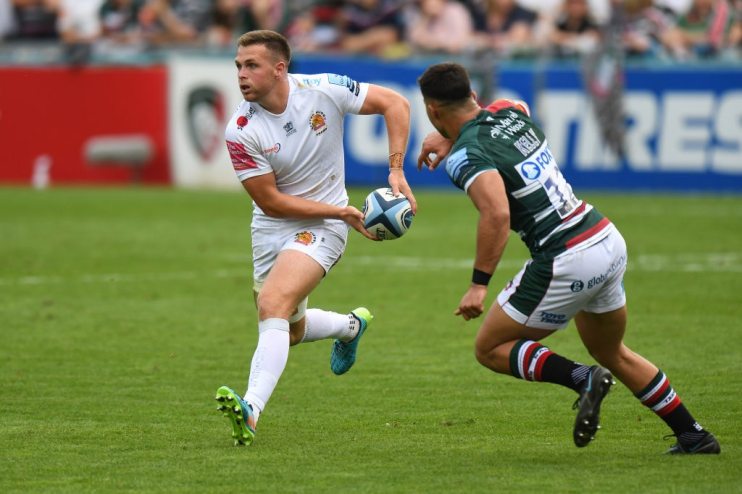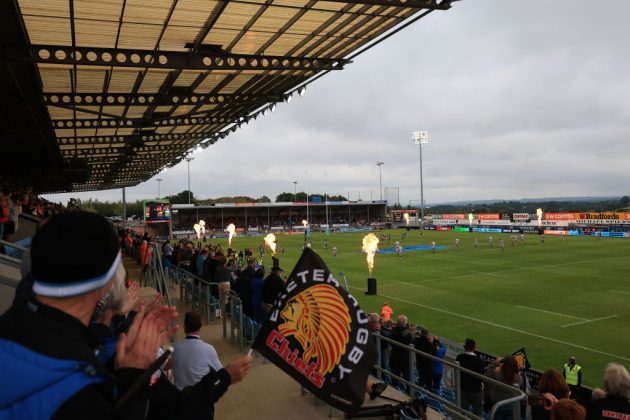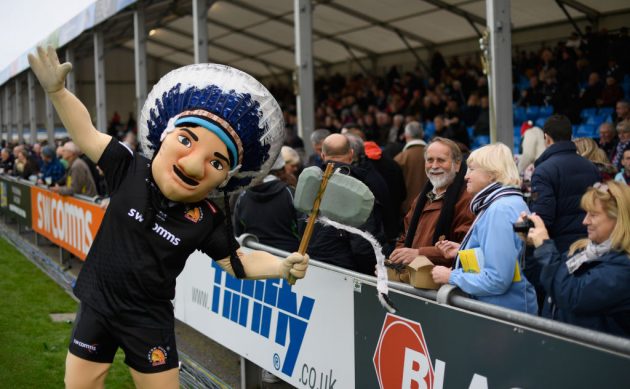Exeter’s chief problem: Why don’t they have a main sponsor?

On Saturday, Exeter Chiefs’ Premiership campaign began with a 34-19 loss at Leicester Tigers. Remove the result, the return of the roaring terraces and professional rugby’s big kick-off, and you may have noticed a commercial anomaly in the away side’s kit: Exeter’s shirt was missing a main sponsor.
Little more than a year ago, Chiefs were the biggest story in the European game, having completed their rise from second tier to Premiership and Champions Cup double winners. Yet now they are without a major partner despite openly touting for one, having gone as far advertising the opening on social media.
The vacancy arose because Exeter’s long-standing deal with the South West Communications Group – branded swcomms – ended in the summer. The company was founded by the club’s chief executive, Tony Rowe, and helped to bankroll their fairytale rise to the top of the game.
But the sale of swcomms in February saw Rowe step away from the business, and swcomms step back from Chiefs. They had never been more successful, so were reportedly asking potential shirt sponsors for £1m a year. But they have faced headwinds from the pandemic, a changing market and damaging accusations that the club’s branding is offensive to Native Americans.
“With swcomms, that was only ever going to be for a period of time,” said Alex Mead, managing director of marketing agency Sporting Eric. “Now you’ve got the situation where, when the deal ended, they had their highest market value. In theory, you’re double champions, you can take the biggest amount of money you could ever take. Your value is the highest it could ever be in rugby.
“The problem comes when you value it at that, who’s going to pay? Then you value it at that amount in a pandemic and who knows what impact that has.”

The landscape of the sports sponsorship market has shifted markedly since Covid-19, with a number of traditional sponsors being replaced by major new players, such as online used car dealers Cazoo and Cinch.
Jon Lane, founder of sponsorship consultancy Brand Affair, said: “From my experience in the sponsorship market, there’s something a bit bigger going on. Given the pandemic, a lot of marketing budgets are very short term at the moment.
“In order to enter into a sponsorship agreement, generally three-to-five year deals, a lot of CFOs are sat there going, ‘we’re actually quite scared about what’s happening in the next three to six or nine months, and you’re asking me to make a multimillion pound commitment’.”
Sponsors now “want more, they want tangible results,” said Ged Colleypriest, founder of Underdog Sports Marketing.
“Back in the day, you would have a sponsorship team who would go out and find things to sponsor. Largely they don’t exist anymore. So when marketing managers are signing off the cheque, they need to know it’s going to work.
“If you look at overall advertising trends, every year, more and more money goes into digital marketing. That said, the effectiveness of things like TV is massively high, and that helps traditional marketing. I do think at some point that’s going to redress the balance with regards to sponsorship.”
Though the market may be a factor in Exeter’s unsuccessful search for a sponsor, some believe their branding could be contributing to the absence of a big backer. Exeter adopted the “Chiefs” identity in 1999 and their logo features a Native American figure. Under pressure from campaigners they recently retired their “Big Chief” mascot.

Neil Hopkins, global head of strategy at M&C Saatchi Sport and Entertainment, said: “Aside from the issue of swcomms changing hands, which is obviously at the root of the need to bring in new commercial partners, there is also a brand issue bubbling under.
“A local pressure group formed last year that is trying to encourage the team to move away from Native American themes and actions linked to their name. We’ve seen such pressure be successful relatively recently in the US with Washington dropping their Redskins nickname [in the NFL] and Baseball’s Cleveland Indians becoming the Guardians in time for the next MLB season.
“Perhaps there is some nervousness due to the pressure being exerted in some quarters around the nature of their brand but, on balance, you would still expect there to be considerable interest in such a successful outfit.”
Paula Kowalska, a senior account manager at Hatch Communications, agrees that the club’s “Chiefs” identity could have posed challenges in finding a sponsor.
“Exeter posted a call out for potential sponsors on their Twitter, which was met with a wave of negative publicity following the mascot scandal from the previous summer,” she said.
“Fans commenting on the post pointed out that it is likely that the team’s branding is responsible for the sponsorship conundrum they have found themselves in, with brands increasingly wary of aligning themselves with organisations that can be viewed as insensitive to certain groups.”
Every Premiership club has been impacted by the pandemic, but only Exeter Chiefs are without a main sponsorship deal. What they do have, however, is a few more possible reasons than other clubs as to why.